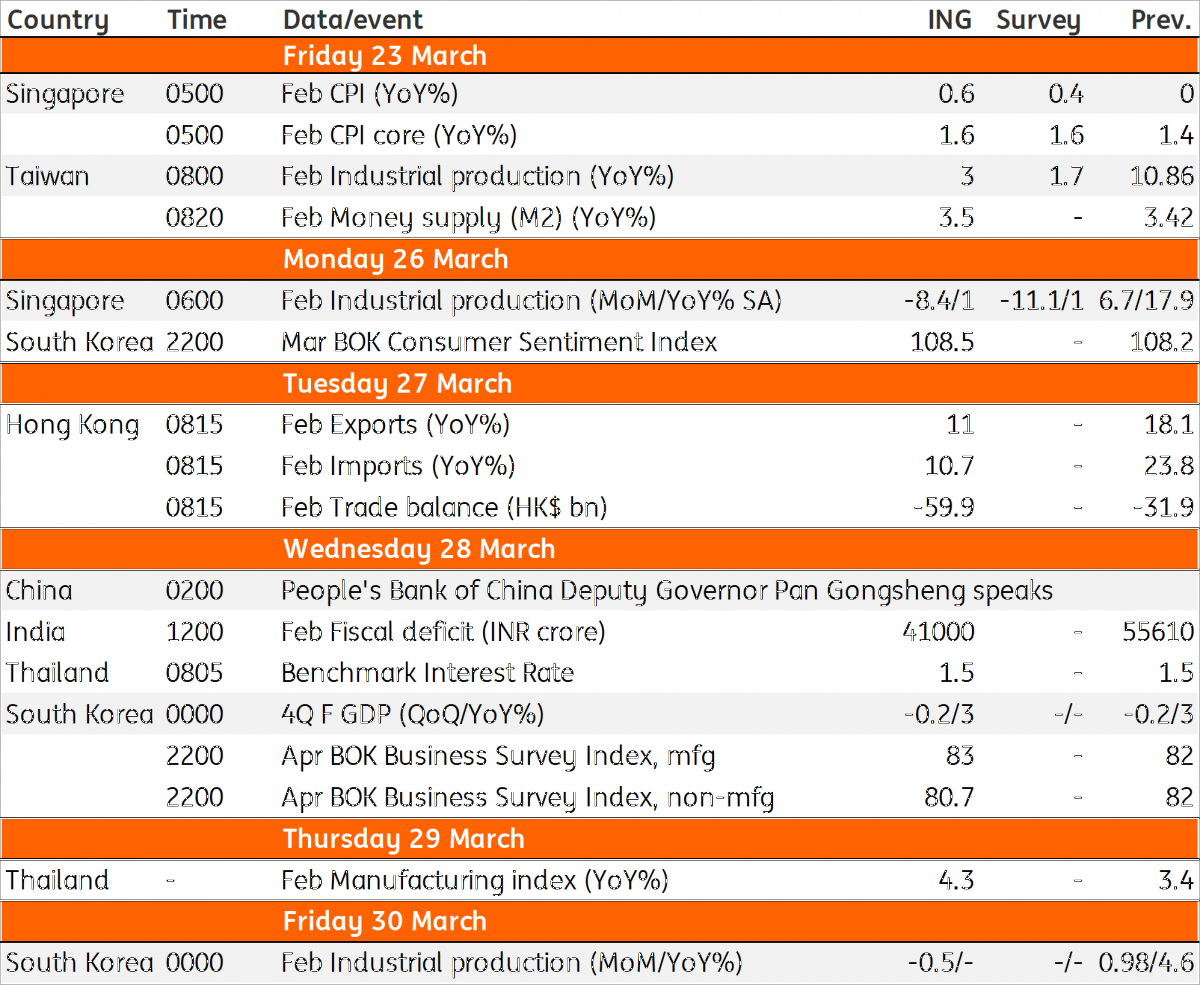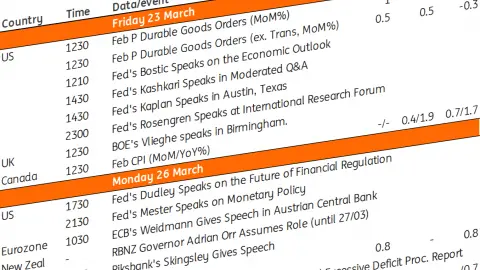Asia week ahead: Manufacturing data crowds calendar
The global trade war threatens Asia’s export-driven growth, which so far has been on a firm footing and we expect next week's manufacturing data to confirm that
Global trade war- a threat to Asia's export-driven growth
The Asian markets will remain under pressure from the global trade war.
Media reports as of writing this article suggest an intensified trade war with the US set to slap $50bn worth of tariffs targeting hundreds of Chinese export goods. Beijing has so far responded with a conciliatory approach by further opening up the economy for foreign competition, but retaliatory measures can't be ruled out.
An intensified trade war will be a threat to Asia’s export-driven growth, but for now, the manufacturing data from the region is likely to show that growth has so far remained strong this year.
| 51.5 |
China manufacturing PMI in MarchING forecast |
China - Manufacturing points to steady GDP growth
China’s manufacturing Purchasing Managers’ Index (PMI) data for March will be watched closely.
Recovery from the Lunar New Year-related slack in activity underlies ING’s forecast of a rise in PMI to 51.5 in March from 50.3 in February.
This is no big deal because the PMI has been bouncing around the 51 level since mid-2011, but markets are still sensitive to the soft data. The hard data showed an acceleration in manufacturing growth; industrial production growth of 7.2% year-on-year in the first two months of 2018 was up from 6.6% average in the fourth quarter of 2017.
This leads us to forecast steady GDP growth in 1Q18 around the 6.8% YoY pace of 4Q17, contrary to the consensus of a slowdown to 6.6%.
Singapore - Should the MAS tighten or not?
February industrial production data is due from Korea, Singapore and Thailand.
Singapore should be the most significant as weak non-oil domestic exports in the first two months of the year undermine the view of the Monetary Authority of Singapore (MAS) moving to tightening in April. As of now, the consensus is tilted toward tightening despite the dismal NODX in February. However, manufacturing data could nudge the bias towards an on-hold MAS policy.
Thailand - BoT policy, steady as it goes
The growth of exports from Korea and Thailand along with manufacturing growth accelerated as we began 2018. We think the markets will rather focus on the forward-looking Korean activity data on consumer and business confidence indicators.
In Thailand, better activity data could provide a further lift to the Bank of Thailand's growth optimism on March 28. But we are still unable to find strong reasons to change our view of no change to the BoT policy throughout 2018.
Headline economic growth has improved, but underlying fundamentals continue to be dogged by weak domestic spending that’s also evident in perennial low inflation.
India - Headwinds to INR appreciation
In India, budget figures for February will be under scrutiny to see the extent of the deficit overshoot in FY17-18 (April-March).
In the first ten months of the current fiscal year, the deficit at INR 6.8tr, was 20% wider on the year, imparting upside risk to the government’s revised forecast of INR 5.9tr or 3.6% of GDP fiscal deficit for the full-year. We expect fiscal slippages to remain among main headwinds for the INR appreciation this year. Other headwinds will be high inflation and widening external trade deficit.
Asian Economic Calendar

Download
Download article
22 March 2018
Our view on next week’s key events This bundle contains 3 Articles"THINK Outside" is a collection of specially commissioned content from third-party sources, such as economic think-tanks and academic institutions, that ING deems reliable and from non-research departments within ING. ING Bank N.V. ("ING") uses these sources to expand the range of opinions you can find on the THINK website. Some of these sources are not the property of or managed by ING, and therefore ING cannot always guarantee the correctness, completeness, actuality and quality of such sources, nor the availability at any given time of the data and information provided, and ING cannot accept any liability in this respect, insofar as this is permissible pursuant to the applicable laws and regulations.
This publication does not necessarily reflect the ING house view. This publication has been prepared solely for information purposes without regard to any particular user's investment objectives, financial situation, or means. The information in the publication is not an investment recommendation and it is not investment, legal or tax advice or an offer or solicitation to purchase or sell any financial instrument. Reasonable care has been taken to ensure that this publication is not untrue or misleading when published, but ING does not represent that it is accurate or complete. ING does not accept any liability for any direct, indirect or consequential loss arising from any use of this publication. Unless otherwise stated, any views, forecasts, or estimates are solely those of the author(s), as of the date of the publication and are subject to change without notice.
The distribution of this publication may be restricted by law or regulation in different jurisdictions and persons into whose possession this publication comes should inform themselves about, and observe, such restrictions.
Copyright and database rights protection exists in this report and it may not be reproduced, distributed or published by any person for any purpose without the prior express consent of ING. All rights are reserved.
ING Bank N.V. is authorised by the Dutch Central Bank and supervised by the European Central Bank (ECB), the Dutch Central Bank (DNB) and the Dutch Authority for the Financial Markets (AFM). ING Bank N.V. is incorporated in the Netherlands (Trade Register no. 33031431 Amsterdam).
